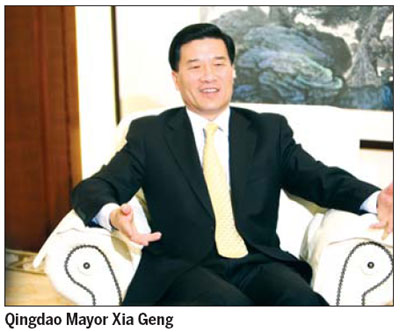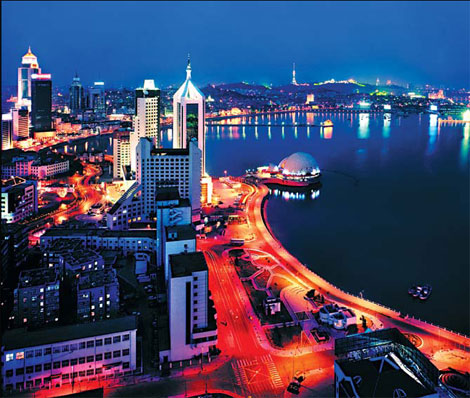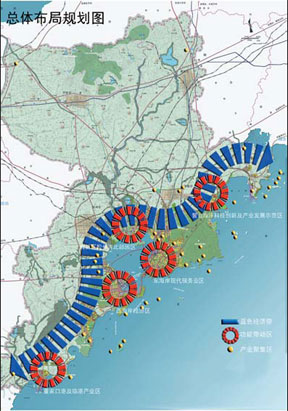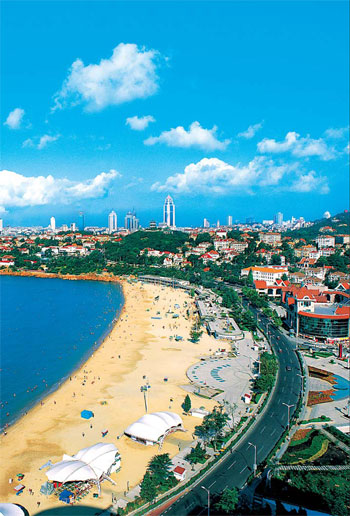News
Famed coastal city center for marine products, shipping
By Xia Geng (China Daily)
Updated: 2011-03-07 08:00
 |
Large Medium Small |
|
Charming coastline in Qingdao. The city hosted sailing races for the 2008 Beijing Olympics. |
Our famed coastal city Qingdao in Shandong province has mapped out plans to be a forerunner in the country's ocean economy by 2015 and a crucial part of the Shandong Peninsula Blue Economic Zone.
The city is also striving to become a center for independent oceanic R&D as well as a demonstration area for protecting the sea ecology.
By 2015 Qingdao expects to lead in the country in modern oceanic industries, generating an added value of 115 billion yuan, an annualized increase of 16 percent.
By 2020 the added value generated by the ocean economy will reach 220 billion yuan through an average yearly increase of 14 percent.
The city plans to be a regional development center for new marine-based industries, an international shipping center for Northeast Asia, an international ocean research center, an international seaside resort and an international water sports hub.
Such goals are based on decisions and demands made by central and provincial governments.
|
Master plan of the Qingdao Blue Economic Zone. |
In 2009, President Hu Jintao called for building the Shandong Peninsula Blue Economic Zone. The State Council then officially approved the country's first national development strategy for an oceanic economy.
The economic zone covers 159,500 square kilometers of offshore waters surrounding Shandong province and 64,000 square kilometers of land that includes six cities - Qingdao, Dongying, Yantai, Weifang, Weihai and Rizhao.
Qingdao will generate 30 percent of the zone's overall economic output, one-fourth of its marine economy and half of State-level marine science and research projects.
Last year the city's marine-based economy - including ocean science and technology, pharmaceuticals, environment protection, biological products - had a total production value of 140 billion yuan, a 55 billion yuan increase over 2009 as its GDP grew by 1 percentage point more than the national economy.
At Chinese Ocean University, the nation's most renowned university for ocean-related science and study, the city has nearly one-third of the country's advanced marine specialists.
Its use of seawater leads in the country, while the 2008 Beijing Olympics and Paralympics sailing regattas further spurred the Qingdao's seaside tourism and yachting industries.
Qingdao port ranks among the top 10 in the world. The city's international airport currently has 94 national and international air routes.
The city has also established a National Laboratory for Ocean Science and Technology that made breakthroughs in ocean biology.
It is now establishing a 10 billion yuan development foundation to strengthen environmental protection.
Last year the city held its first international summit on the marine economy.
It has also accelerated construction of the Dongjiakou Port Area - a shipbuilding and repair base in Haixiwan Bay - along with its high and new-technology economic zone.
In the next five years Qingdao will emphasize the following:
The city will foster and strengthen the dominant ocean economy and take the lead in the country to reach a modern marine industry system.
The system will mainly focus on modern fisheries such as aquatic breeding and farming, producing marine engineering, instruments and chemicals, modern ocean service industries such as port logistics and seashore tourism, and strategic new industries such as marine biology and eco-environment protection.
Qingdao will deepen cooperation with noted scientific research institutes at home and abroad and push further to develop the National Laboratory for Ocean Science and Technology, deep ocean bases and ocean science research ships.
The city will invest more in ocean science and technology research and development to acquire more core technologies with self-owned intellectual property right.
By 2015 new marine scientific and technological industries will rise from 17 percent currently to 25 percent of the total marine-based industrial production value.
Qingdao will also establish a database for major blue economy projects and each year select and implement a number of those through large investment and huge influence.
This year key projects include the continuing construction of Dongjiakou Port Area, the construction of Qingdao Bonded Port Area phase two, Sino Petro LNG projects with an overall investment of 10 billion yuan, the Sea Carnival project in Qingdao Economic and Technological Development Zone's Huangdao Area with an investment of 3 billion yuan as well as the planning and construction of new Qingdao international airport.
The author is mayor of Qingdao.

|
Beaches in Qingdao attracts thousands of domestic and foreign tourists every year. Photos provided to China Daily |
(China Daily 03/07/2011 page24)
| 分享按钮 |


